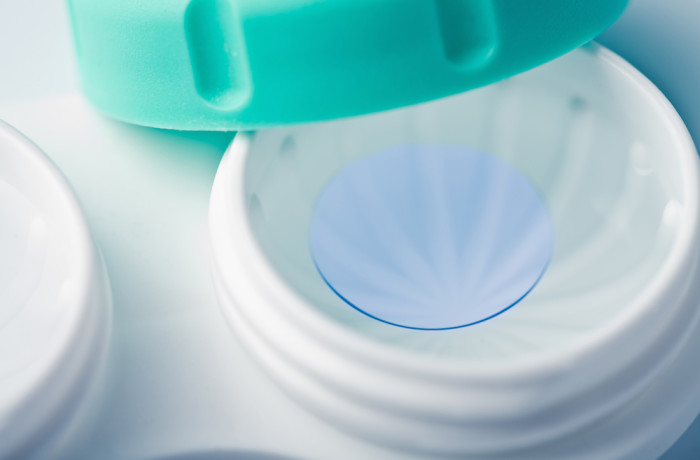Everyday, millions of people wear contact lenses to help them see clearly. There have been numerous advancements in both lens materials and designs, allowing most individuals to wear contact lenses successfully. As a result, there are more contact lens choices available than in the past.
If you have worn contact lenses in the past but discontinued use due to discomfort or unacceptable visual results, it may be time to revisit your options. At SAMPLE OPTICAL, we will help you select the best option for you based on the health and shape of your eyes, the type of correction you require, your previous contact lens experience, your tear production and your lifestyle.
Soft Contact Lenses
Soft contact lenses are the most common type and account for over 85% of contact lenses dispensed. Traditional soft contact lenses are made of soft plastic polymers and water. They allow oxygen to permeate through the lens material to the cornea and are generally very comfortable. The advantages of soft contacts are that they are almost instantly comfortable and come in many different prescriptions and designs. The potential disadvantage is that (for some prescriptions) they do not offer the same visual acuity as gas permeable lenses. Your eye care professional can help you determine which design will be best for your prescription.
Disposable Contact Lenses
Disposable contact lenses are soft lenses designed to be discarded on a daily, weekly, bi-weekly, or monthly basis. By replacing lenses on a regular basis, long-term protein deposits (which can affect vision, comfort, and the health of the eyes) do not build up. They are convenient and require less maintenance than traditional soft lenses. It is important that disposable contacts be replaced at their designated time to avoid eye infection. Disposable lenses are available in most prescriptions.
Extended Wear Contact Lenses
Extended wear contact lenses are gas permeable or soft lenses, which are worn continuously for up to 30 days. While extended wear lenses offer the convenience of not having to take them out at night, sleeping in contact lenses results in a higher risk of developing infections, corneal ulcers and abnormal blood vessel growth in the cornea. Therefore, more frequent follow-up is required and some doctors will not recommend extended wear lenses.
Tinted or Cosmetic Contact Lenses
Tinted contact lenses are soft lenses that enable most patients to change the color of their iris (the colored portion of their eye). These lenses are available in many exciting colors and can provide a subtle or dramatic change in the appearance of your eyes. They are not available for all prescriptions.
Hard Contact Lenses
Before soft contact lenses were introduced, hard contact lenses made of PMMA, or polymethyl methacrylate were used. They did not allow for oxygen transfer to the cornea and often caused the cornea to swell. For this reason, hard contact lenses are considered obsolete and are rarely used.
Rigid Gas Permeable Lenses
Rigid Gas Permeable (RGP) or just Gas Permeable (GP) lenses are sometimes mistaken for the old-fashioned hard contact lenses but are more pliable, more comfortable and most importantly, allow oxygen to the cornea. In fact, gas permeable lenses transmit more oxygen to the cornea than do traditional soft contact lenses. Because gas permeable lenses are rigid, they do not change their shape when you blink and can offer sharper vision than soft contacts. They are much more durable than soft lenses and because they do not contain water, proteins and lipids do not adhere to them as easily as with soft lenses. GP lenses also come in numerous bi-focal and multi-focal designs.
The biggest disadvantage to GP lenses is that they are not immediately comfortable like with soft lenses. In general, they take 3 to 4 days to adapt to and they need to be worn regularly (although not every day) to achieve maximum comfort. Also, because they are smaller in size, they can dislodge from the eye more easily than soft lenses.
Toric Contact Lenses
Toric contact lenses are designed to correct for astigmatism. They are available in both soft and gas permeable designs. These lenses have one power vertically and another horizontally and are weighted at the bottom, allowing the lenses to center correctly on the eye. Toric lenses are more difficult to fit and generally require more time from the patient and doctor for fitting and adaptation.
Bifocal Contact Lenses
Bifocal contact lenses, similar to bifocal glasses have more than one power to allow an individual to have clear vision, near and far. They are available in both soft lens and gas permeable lens designs. Another alternative to bifocal contacts is monovision correction. With these lenses, one eye is used for distance and the other eye for near or reading vision. Both of these lens types require more time from the doctor for fitting. They also require more time for the patient to adapt to.



